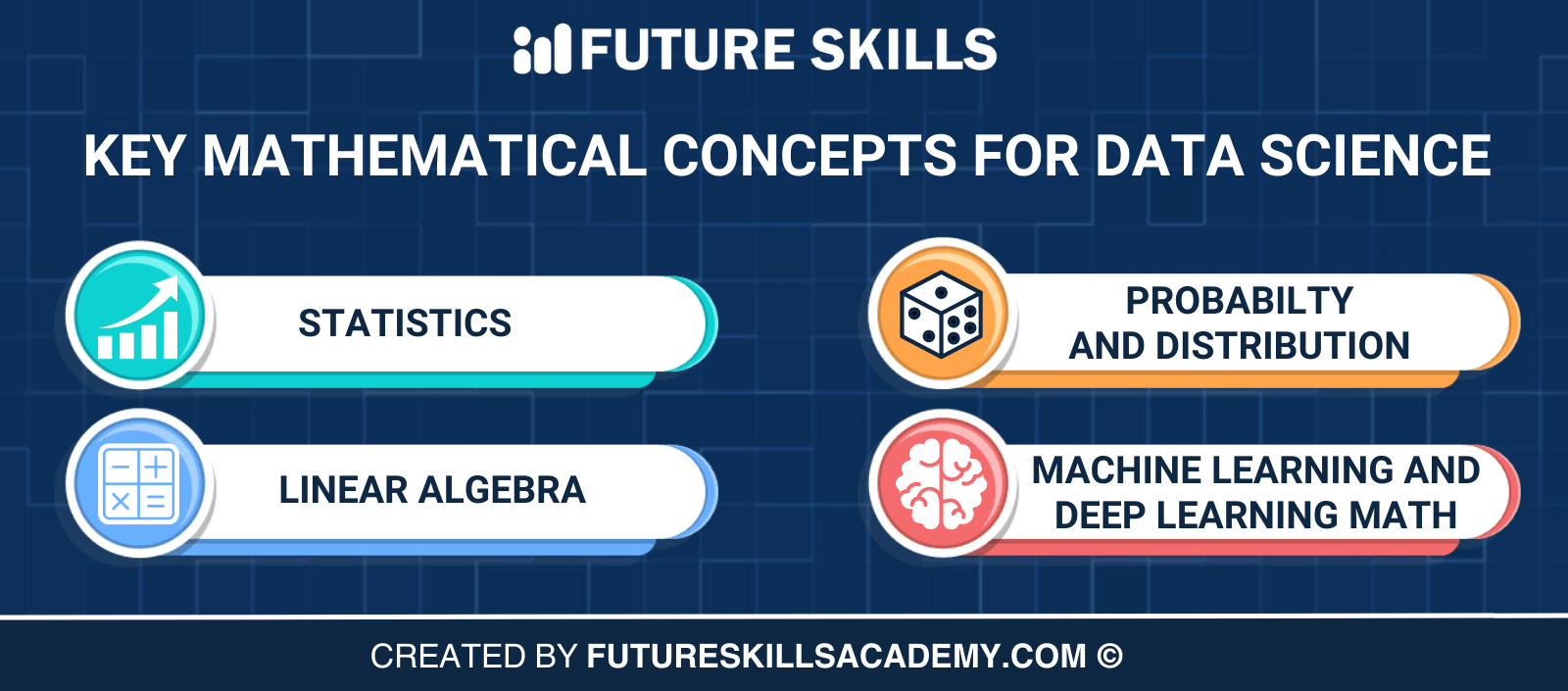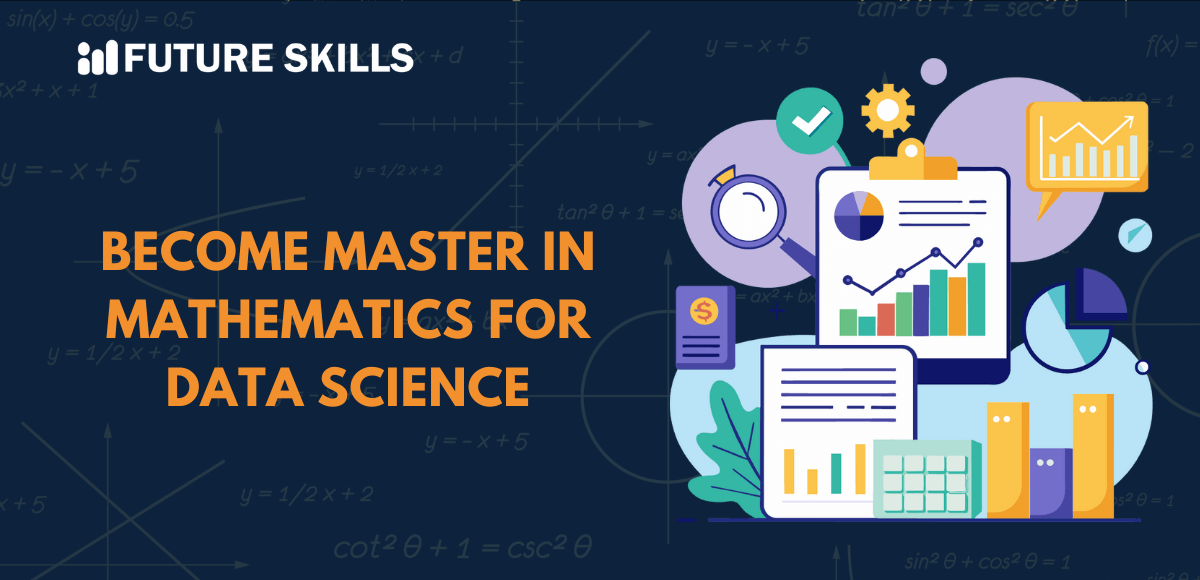Data science is the domain that involves the study of data to uncover meaningful and valuable insights. Professionals working in the data science domain need to work on complex algorithms, models, and frameworks. In the technology-driven environment, the application of mathematical concepts is of paramount importance.
In fact, professionals such as data scientists leverage their mathematical skills and prowess to efficiently extract, process, analyze, and visualize data. It is an understatement to say that mathematics for data science is necessary. Instead, without the application of relevant math, it is not possible to imagine data science.
Harness the power of AI and boost creativity and innovation through our Certified AI Professional (CAIP)™ Certification program.
Why is learning mathematics essential in Data Science?
Several mathematical concepts exist at the core of data science. Concepts such as calculus, linear algebra, and optimization techniques underpin algorithms. Moreover, a solid understanding of appropriate mathematical principles and concepts is essential to effectively work on machine learning models. By mastering data science mathematics, you can unlock the capabilities of the domain to the fullest.
Data Science combines a diverse range of disciplines, such as math, statistics, Artificial Intelligence (AI), advanced analytics, Machine Learning (ML), and specialized programming. Having appropriate subject matter knowledge and expertise is instrumental for professionals.
By having comprehensive insight into different sub-concepts, professionals can efficiently extract actionable insights. Moreover, these insights can allow them to make well-informed strategic decisions and action plans. Without appropriate data science and math skills, the ability of professionals to uncover valuable insights may be hampered significantly.
Value of Math in Data Science
Mastery of mathematical concepts can give rise to immense value for professionals. By equipping yourself with appropriate mathematical skills as well as competencies, you can perform your duties optimally. Below are some of the ways data science mathematics can help you in the data science domain:
- You need to apply mathematical principles while working on different types of algorithms and ML models.
- Mathematical thinking is necessary to convert complex real-life issues into mathematical formulations.
- By applying data science math skills relating to linear algebra and optimization, you can enhance the efficiency of models.
- The use of statistical concepts is vital to making informed decisions
If you wish to build a career in data science, a solid foundation in mathematics for data science is pivotal. Without a solid math background, you may find it challenging to thrive in the evolving and dynamic data science environment.
Important mathematical concepts

Are you wondering – What is the mathematical basis for data science? If yes, this is a common question that may arise in your mind before embarking on your data science journey. Before diving into the steps for mastering data science mathematics, you need to address the following questions: Below are some of the main mathematical concepts that you should work on to advance in the data science landscape.
Statistics
Some of the important statistical concepts that are essential in data science are descriptive statistics and inferential statistics. Furthermore, you need to be proficient in sub-topics like hypothesis testing and central limit theorem. A solid statistical foundation can certainly enhance your skills as a professional working in the data science realm.
Linear Algebra
Linear Algebra is one of the fundamental concepts in mathematics for data science. Some of the main topics that need to focus on are matrix decompositions, vectors, matrices, etc. In order to strengthen your competencies on the subject, you need to carefully select a data science mathematics book that covers the topic in detail.
Probability and Distribution
In the data science discipline, the importance of Probability and Distribution is immense. These concepts can help data scientists to uncover underlying data patterns. Furthermore, these valuable insights can help in developing robust models.
Machine Learning and Deep Learning Math
A solid understanding of the mathematics relating to Machine Learning and Deep Learning is essential in data science. As a data science professional, you need to be proficient in optimization techniques, loss functions, cost functions, etc. Concepts relating to decision trees, neural networks, and logistic regression can also be applied to diverse operations in the data science domain.
If you have a genuine interest in having a career in data science, you must start developing your mathematical skills. The math concepts that have been identified can help you address the question – What is the mathematical basis for data science? Now that you have better familiarity with math concepts that are relevant to data science, it is time to focus on the learning process.
Learn the difference between machine learning and artificial intelligence with our Machine Learning vs Deep Learning Guide!
Pathway to master mathematics
If you wish to become a master in mathematics for data science, you need to adopt the right kind of attitude and mindset. Learning a wide range of math concepts might not be a very easy task. However, you also need to keep in mind that it is not any kind of rocket science. You need to cultivate patience, optimism, determination, and persistence so that you can progress in your learning journey. The steps below will definitely guide you in working on your mathematical skills and prowess that are relevant to data science.
Choosing the right resources
One of the fundamental steps is to select the right materials to build on your data science math skills. As numerous resources are available today, it might not be easy choosing the right book. The data science mathematics book below will help you get a comprehensive grasp of different math concepts.
- You can improve your knowledge of statistics by reading the book – The Art of Statistics: How to Learn from Data, written by David Spiegelhalter.
- For building a solid foundation on Linear Algebra, a valuable learning resource is Linear Algebra and Its Applications, written by David C. Lay.
- Introduction to Probability for Data Science, which is written by Stanley H. Chan, can surely improve your understanding of mathematical concepts.
- Mathematics for Machine Learning by M. P. Deisenroth, A. A. Faisal, and Cheng Soon Ong is a useful resource for mastering math concepts that are applicable to ML.
Want to learn mathematics for machine learning. Here is detailed guide on how to learn Mathematics for Machine Learning.
Combining diverse materials to have holistic learning
In the current learning environment, you do not have to rely on textbooks alone to learn. There is a broad range of other resources that can help enrich your learning experience. There are a number of informative channels on YouTube that can help you understand different math concepts relating to data science. The visual learning approach may be appealing to several learners. Furthermore, it can help to grasp challenging concepts in a simplified manner.
Availability of online courses
If you want to seek the help of professionals to master mathematics for data science, you can enroll in an online course. Several online courses are available to help learners develop their knowledge and skills in data science and mathematics; before finalizing any course, you need to focus on the concepts covered and customer reviews.
Solving online assignments
No learning process can be completed without putting in effort and time. When it comes to mathematics, you need to make sure that you practice and revise each of the concepts numerous times. You need to allocate several hours regularly to practice key mathematical concepts that are important in data science. Without constant practice, you will not be able to build a solid math foundation. It may act as an impediment in your path and hinder your ability to grow as a data science professional.
By following the simple steps, you will be pleased to know that your math skills will get much better. Furthermore, you will feel more confident about building a career in data science and thrive in a competitive environment. Throughout your learning process, you need to believe in your capabilities and skills. There may be times when you may face new challenges or obstacles. However, your determination and strategic approach to learning will help you master data science mathematics.
Build a bright career in AI as a Certified Prompt Engineer with our accredited Certified Prompt Engineering Expert (CPEE)™ program.
Conclusion
In the data science discipline, a solid foundation in mathematics is essential for professionals. The step-by-step guide can help you adopt a systematic approach to becoming a master in data science and math. You need to focus on several key mathematics concepts such as statistics, linear algebra, probability and distribution, and mathematics for machine learning and deep learning.
By developing solid competencies in these areas, you can prepare yourself to have a solid career in the data science domain. While learning these concepts, the proper selection of appropriate resources and materials is instrumental. By referring to the guidance, you will be able to locate high-quality resources that can add value to your learning journey. In addition to relying on books, you can integrate other learning components such as informative videos, online assignments, and online courses.





